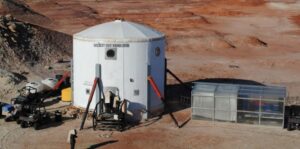

Leh, Aug 01: In a significant development for India’s Mars mission, scientists from the Indian Institute of Science (IISc) and Birbal Sahni Institute of Palaeosciences (BSIP) have identified Ladakh as the ideal site for the country’s first Mars and Moon analogue research station.
An analogue research station is a facility where activities intended for Moon and Mars missions can be simulated. For instance, astronaut habitats can be built and tested due to the geological similarities with extraterrestrial conditions. The station will also allow for studying how microbes and other organisms react to such extreme environments.
The research, spearheaded by Binita Phartiyal from BSIP and IISc’s Aloke Kumar, along with Shubhanshu Shukla — one of India’s four Gaganyaan astronauts — comes as India ramps up its space programme, including plans for a space station by 2035 and a Moon landing by 2040.
Lead authors Phartiyal and Kumar highlighted Ladakh’s unique geographical characteristics, which closely mimic Martian and Lunar landscapes. The region’s cold, arid desert, rocky terrain, and geomorphological similarities to early Mars and the Moon make it excellent for simulating extraterrestrial conditions.
According to Phartiyal, Ladakh offers a natural laboratory for testing equipment, training personnel, and conducting essential scientific studies. She said its environment provides geochemical, geomorphological, and astrobiological fidelity to Mars and Moon.
Phartiyal, who has conducted research in Ladakh nearly every year since 2000, remarked that being there often feels like being on a different planet altogether. She also participated in NASA’s Spaceward Bound India programme in 2016, which highlighted Ladakh’s high-altitude ecosystem as having Mars-like topological features.
The proposed research station would serve multiple functions: a testing platform for space technologies, advancing Technology Readiness Levels (TRL), engineering integration, human studies and crew training, and geological and astrobiological research.
Establishing such a facility would greatly enhance India’s space programme, especially the Indian human space programme and future Mars missions. It would also offer valuable opportunities for studying extremophiles and conducting comparative research with samples from India’s polar research stations.
Kumar noted that this is an opportune time for India to join the global community in establishing analogue research stations. He stated that it would benefit the space programme, promote astro tourism, and support local communities in Ladakh.
This proposal follows India’s recent milestone of inducting four astronaut designates, highlighting its increasing commitment to space exploration.
As India positions itself as a major player in the global space arena, the Ladakh analogue research station could be crucial in achieving its extraterrestrial ambitions, providing a vital resource for scientific research, technological development, and astronaut training in the future.
Last week, it was reported that India is set to send an astronaut to the International Space Station (ISS). Space Minister Jitendra Singh announced in Lok Sabha that an Indian astronaut, referred to as a “gaganyaatri”, will soon travel to the ISS as part of a mission in collaboration with the Indian Space Research Organisation (ISRO), NASA, and Axiom Space.
In response to a query from Trinamool Congress MLA Saugata Roy, Singh detailed that this joint mission will involve one ISRO astronaut traveling to the ISS. This collaboration has been formalized through a space flight agreement with Axiom Space. NASA confirmed the mission, designated as Axiom-4, which is set to launch no earlier than August 2024 from Kennedy Space Center in Florida.
The astronaut chosen for the ISS mission will be one of four Indian Air Force (IAF) pilots currently training for ISRO’s Gaganyaan mission. These astronauts, selected by ISRO’s Astronaut Selection Board, underwent basic spaceflight training in Russia during the Covid-19 pandemic and are continuing their training at ISRO’s astronauts training facility in Bengaluru.



